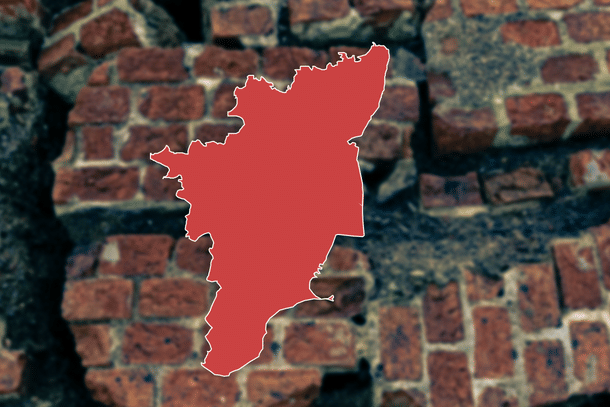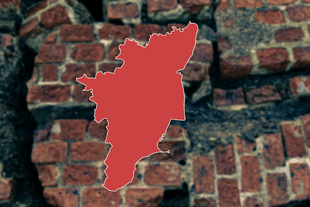Politics
This Fringe Group Was Behind The Rumour Of Mass Conversion Of Dalits To Islam In Tamil Nadu, And Here’s Why It Did What It Did
M R Subramani
Dec 31, 2019, 02:59 PM | Updated 05:29 PM IST
Save & read from anywhere!
Bookmark stories for easy access on any device or the Swarajya app.


On 25 December this year, mainstream media in Tamil Nadu reported that 3,000 Dalits would convert to Islam following the state government’s ‘failure’ to take action on an incident in which a wall collapse at Nadur in Coimbatore district left 17 persons dead.
However, enquiries by various organisations and Swarajya reveal that they were mere rumours and the needle of suspicion points to a fringe outfit called Tamil Puligal Katchi (TPK or Tamil Tigers Party) for spreading them.
The TPK and its cadres, political activists in Mettupalayam allege, are the ones who have spread this rumour, aggrieved over the continuous detention of their leader Nagai Thiruvalluvan.
Thiruvalluvan was arrested on 3 December along with 24 persons for attempting to create unrest in Mettupalayam, 40 km from Coimbatore.
They attempted to mislead people on the death of 17 persons in a wall collapse at Nadur village near Mettupalayam.
Political activists in Mettupalayam say though Thiruvalluvan was given bail on 6 December, he was arrested the next day in connection with a stone pelting case at a government transport corporation bus in Dharapuram in Tirupur district.
The stone pelting incident occurred on 2 December and three more persons were arrested for the incident in which two persons were injured and the bus was damaged.
“There are many cases pending against Thiruvalluvan. He is a fit case to be detained under the Goondas Act,” said a political activist in Mettupalayam without identifying himself.
Since Thiruvalluvan has been under detention for nearly a month, the TKP has been arguing that while those responsible for the wall collapse have been let out on bail, its leader is being detained continuously since he belongs to the Scheduled Caste.
“The TKP and its cadres are unable to digest the fact that their leader has not able to get bail and hence, they resorted to spreading rumours,” the activist said.
What exactly is the problem relating to the wall collapse incident?
Seventeen persons, including 12 women and two children, were killed when the compound wall of a house fell on four houses following heavy rains in the region.
Opposition parties in Tamil Nadu tried to whip up passions over the deaths, alleging that the wall was constructed to prevent the Adi Dravidas — who are notified Scheduled Castes — from entering the area of the upper caste people.
S Sivasubramanian, the owner of the premises whose wall collapsed, belonged to the Other Backward Community (OBC) caste. A textile shop owner, he was arrested on 6 December. (The Madras High Court gave him conditional bail on 20 December. )
Dravida Munnetra Kazhagam (DMK) president M K Stalin initially termed the deaths as “victims of untouchability wall” before changing his stand within an hour.
A few political organisations such as the Viduthalai Chiruthaigal Kazhagam (VCK and Tamil Nadu Muslim Munnetra Kazhagam (TMMK) tried to politicise the tragedy by repeatedly referring to wall as “theendamai suvar”‘ or wall of caste discrimination.
Swift police action through arrests of those attempting to provoke “social” unrest helped to bring the situation under control by 8 December.
VCK and TMMK demanded that the textile shop owner be charged with provisions of the Scheduled Castes and Tribes (Prevention of Atrocities) Act as the those killed were Adi Dravidas.
Their main contention was the wall was 20 feet high and it was constructed as Sivasubramanian did not want to see the Adi Dravidas living behind his compound.
Those who raised the discrimination charges alleged that a compound wall cannot be over eight or nine feet in height.
They claimed that Nadur residents objected to the height of the wall, including with Revenue Department officials, but they received “casteist slurs” as a response.
According to Krishnaswamy, the brother of Sivasubramaniam, the portion of the wall that collapsed was on a property that was bought 30 years ago.
The wall was there when the property was bought and Sivasubramanian had only carried out maintenance works on it.
Krishnaswamy said the height of the wall was raised by about two feet to around 10 feet, mainly to prevent people jumping into their compound.
Those defending Sivasubramanian say that the wall looked taller than the original height as the compound was situated on a higher altitude in Cooperative Colony and from Nadur, which was adjacent to it, the wall appeared to be a huge one.
Local politicians contended that the allegation of “wall of discrimination” were raised by “outsiders” — those who did not belong to Mettupalayam.
Then, Puthiya Tamizhagam leader K Krishnaswamy, who lives near Coimbatore, termed the controversy as a needless diversion and filing cases under the Scheduled Castes and Tribes (Prevention of Atrocities) Act was not warranted.
In the Lok Sabha, VCK Member of Parliament D Ravikumar claimed the wall was an illegal construction. But Revenue Department officials say that the wall has been constructed on a compound that was duly registered.
Ravikumar, however, conceded that there was no clear-cut definition on what was a “wall of discrimination” and added that the wall should have been constructed in a way that it would not affect people.
Thus, attempts to play up the incident and gain political mileage petered out.
“When media reported that people were going to convert to Islam, some of us visited Nadur. The people there are upset that they are in the news for the wrong reasons. They have no intention or plan to convert as they are all devout Vaishnavites,” the political activist said.
On social media, too, the conversion was denied with videos of the denial making rounds. In the video, the locals are seen saying that no Muslim would be allowed into their village for conversion.
The Indu Makkal Katchi, on its part, visited the village and put out this video to call media reports on conversion as “fake news”.
The reports of religious conversion made rounds for two reasons. One, trouble makers wanted to revive their efforts to create unrest for vested interests. Two, the TKP and its cadre tried to spread the rumour mainly because they were upset over the continuous detention of Thiruvalluvan.
The problem for these vested interests is that the Tamil Nadu police seems to be alert to these manoeuvres of these “trouble creators” and is sparing no effort to rein them in. Otherwise, there is no reason why someone like Stalin should change his stand within an hour.
For now, the people in Nadur village plan to conduct a special ritual (moksha deepam) for the departed souls before the current auspicious Tamil month of Margazhi gets over.
M.R. Subramani is Executive Editor, Swarajya. He tweets @mrsubramani





